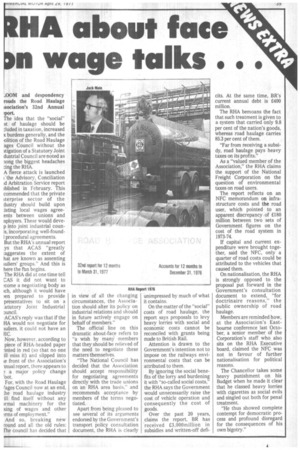HA about face n wage talks .
Page 41

If you've noticed an error in this article please click here to report it so we can fix it.
...00M and despondency rouds the Road Haulage isociation's 32nd Annual !port.
The idea that the "social" st of haulage should be cquded in taxation, increased burdens generally, and the ■ olition of the Road Haulage • ages Council without the stigation of a Statutory Joint dustrial Council are noted as aong the biggest headaches ring the RHA.
A fierce attack is launched (the Advisory. Conciliation id Arbitration Service report iblished in February. This commended that the private iterprise sector of the dustry should build upon -isting local wages agreeents between unions and nployers. These would devep into joint industrial counts, incorporating well-foundI procedural agreements.
But the RHA's annual report .ys that ACAS "greatly :aggerates the extent of hat are known as assenting itiliers' groups." And this is here the Um begins.
The RHA did at one time tell CAS it did not want to !come a negotiating body as ich, although it would have en prepared to provide presentatives to sit on a :atutory Joint Industrial auncil. ACAS's reply was that if the HA would not negotiate for tuliers, it could not have an !IC.
Now, however, according to piece of RHA-headed paper -inted in red (so that no one ill miss it) and slipped into Le front of the Association's -mai report, there appears to ?, a major policy change bot.
For, with the Road Haulage /ages Council now at an end, he road haulage industry ill find itself without any )rmal machinery for the xing of wages and other !rills of employment."
And so, breaking new round and all the old rules: The council has decided that in view of all the changing circumstances, the Association should alter its policy on industrial relations and should in future actively engage on behalf of members.'
The official line on this dramatic about-face refers to "a wish by many members that they should be relieved of the need to negotiate these matters themselves.
"The National Council has decided that the Association should accept responsibility for negotiating agreements directly with the trade unions on •an RHA area basis," and recommends acceptance by members of the terms negotiated.
Apart from being pleased to see several of its arguments endorsed by the Government's transport policy consultation document, the RHA is clearly unimpressed by much of what it contains.
On the matter of the "social" costs of road haulage, the report says proposals to levy heavy lorries with social and economic costs cannot be reconciled with grants being made to British Rail.
Attention is drawn to the Government's intention not to impose on the railways environmental costs that can be attributed to them.
By ignoring the social benefits of the lorry and burdening it with "so-called social costs," the RHA says the Government would unnecessarily raise the cost of vehicle operation and consequently the cost of goods.
Over the past 20 years, claims the report, BR has received £3,000million in subsidies and written-off defi cits. At the same time, BR's current annual debt is £400 million.
The RHA bemoans the fact that such treatment is given to a system that carried only 9.8 per cent of the nation's goods, whereas road haulage carries 85.3 per cent of them.
"Far from receiving a subsidy, road haulage pays heavy taxes on its profits."
As a "valued member of the Association," the RHA claims the support of the National Freight Corporation on the question of environmental taxes on road users.
The report reflects on an NFC memorandum on infrastructure costs and the road user, which pointed to an apparent discrepancy. of £180 million between two sets of Government figures on the cost of the road system in 1973-74.
If capital and current expenditure were brought together, said the NFC, only a quarter of road costs could be attributed to the vehicles that caused them.
On nationalisation, the RHA is strongly opposed to the proposal put forward in the Government's consultation document to extend, "for doctrinaire reasons," the public ownership of road haulage.
Members are reminded how, at the Association's Eastbourne conference last October, a senior member of the Corporation's staff who also sits on the RHA Executive board, claimed the NFC was not in favour of further nationalisation for political reasons.
The Chancellor takes some heavy punishment on his Budget when he made it clear that he classed heavy lorries with cigarettes as social evils and singled out both for penal treatment.
"He thus showed complete contempt for democratic process and profound disregard for the consequences of his own bigotry."




















































































































































































